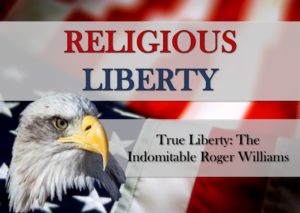 In civil things we may be servants unto men, yet in divine and spiritual things the poorest peasant must disdain the service of the highest prince. -Roger Williams
In civil things we may be servants unto men, yet in divine and spiritual things the poorest peasant must disdain the service of the highest prince. -Roger Williams
When Roger Williams arrived on the shores of Massachusetts in February of 1631, he quickly found himself swimming against the Puritan tide championed by Governor John Winthrop. Although the governor initially declared Williams to be “godly”[i] and invited him to become the minister of the church in Boston, he declined. A diehard Separatist, Williams refused to affiliate with a church that had not severed all Anglican ties. Furthermore, contrary to the authorities in Boston, he held the conviction that civil magistrates had no right punish citizens for refusing to take part in religious activities.
After Williams realized that his views made him unwelcome in Boston, he relocated to Plymouth, where his unorthodox of religious freedom views once again kindled dissention. A short two years later he decided to take over the church in Salem. As we would expect, his tenure in Salem was also filled with unrest. One of the primary points of contention for Williams was that the magistrates of the Massachusetts colony required oaths of allegiance from its citizens. Williams took issue with this because he considered oath-taking to be an act of worship. Requiring an oath, according to Williams, was paramount to forcing a religious act and was therefore outside of the authority of government.
In 1635, the issue of the oaths took center stage as the Salem church asked the General Court of Massachusetts for a title to its land. The Court refused to comply because the allegiance of the church to the colony was not established. Williams could not let this act of defiance go unpunished, because he realized that true liberty did not exist when a government entity could refuse to hear a case simply because a person or organization has not pledged allegiance to the state. This was the final straw for Williams. He wrote to the other churches in the colony, asking them to rebuke their members who were unduly involved with the government, and when they refused to do so, he petitioned his own congregation to withdraw fellowship from those churches. When this request was denied, he cut off ties to his own church and spent most of the remainder of his life seeking the elusive “true” church of the apostles.
In October of 1635, the authorities in Salem tired of Williams and banished him from their city. The decree of banishment stated that he had “broached and divulved new and dangerous opinions against the authority of magistrates.”[ii] The term “dangerous opinions” served as code for his belief that civil rulers held no authority over how a person worships God. Because of his fragile health, he was granted the liberty to stay in Salem until spring. However, when the authorities heard of his plans to settle at Narragansett Bay, they planned to have him extradited to England for fear that because of his outspoken beliefs “infection would easily spread”[iii] into the churches in Massachusetts. He refused to appear when summoned, and when they arrived at his house to take him by force, he had already departed.
Williams experienced a very difficult winter as he negotiated the frozen forest. In the spring of 1636, he finally arrived at Narragansett Bay and founded Providence Plantations, so named because of God’s care for him over the winter. Some loyal members of his congregation in Salem migrated to Providence with him and in 1638 they drafted a compact in which they promised to submit themselves to their government “only in civil things.”[iv] Roger Williams was not taking any chances. Providence, which would eventually unite with the nearby settlement of Rhode Island, would be founded upon the premise that the authority of government is limited to civil life and the magistrates cannot dictate how one worships God.
In 1663, King Charles II of England officially granted a charter to the colony of Rhode Island allowing religious freedom. The charter stated that “no person…shall be in any wise molested, punished, disquieted, or called in question, for any differences of opinion in matters of religion”[v] as long as they were not disturbing the peace. Rhode Island was therefore “the pioneer in a great revolution”[vi] as its guarantee of absolute religious liberty became the foundation of the laws of each of the United States.
Roger Williams proved his dedication to religious liberty when he allowed freedom even for those with whom he disagreed. He disliked the Quakers, for example, but allowed them into Rhode Island when they also were forced from Massachusetts.[vii] This is a mark of true religious liberty—even differing opinions are permitted to thrive.
In 1963, the United States Supreme Court linked Williams with James Madison and Thomas Jefferson as instrumental in the views enshrined in not only the United States Constitution, but also the constitutions of most states.[viii] After the experiment with a close relationship between civil and church government proved untenable in the New World, the idea of religious freedom as promoted by Williams slowly permeated the colonies. Roger Williams was truly a man born before his time, but God used him as the providential spark that fanned the flame of true religious liberty in the United States.
The valuable contribution that Roger Williams made to America was formally recognized in 1872 when a memorial statue was erected in his honor in the national capitol. At the dedication of the statue, Rhode Island Senators William Sprague and H.B. Anthony made remarks. Sprague complimented Williams for propagating the “then strange and heretical doctrine”[ix] of absolute separation of church and state. Senator Anthony depicted Williams as a man who “did not merely lay the foundations of religious freedom . . . [but] constructed the whole edifice.”[x]
The influence of Roger Williams on America was further recognized by the United States government when, in 1936, the Commonwealth of Massachusetts passed a bill which removed his sentence of expulsion from state law. Thus, almost three centuries after his death, Roger Williams, the champion of true religious freedom, finally became a free man.
Next article: Elevating Christian Liberty: William Penn
Previous article: A Model of Christian Charity: John Winthrop and the Puritans
See the other articles about religious liberty
[i] Ibid., 34 Feb. 5, 1631.
[ii] Henry Vedder, A Short History of the Baptists (Valley Forge, PA: Judson Press, 1907), 289.
[iii] Winthrop, Journal, 87.
[iv] Vedder, A Short History of the Baptists, 290.
[v] Vedder, A Short History of the Baptists, 290.
[vi] Ibid., 291.
[vii] Mark A. Noll, A History of Christianity in the United States and Canada (Grand Rapids: Wm. B. Eerdmans Publishing Company, 1992), 65.
[viii] School Dist. of Abington Tp v. Schempp, 374 US 203 205, 241 (1963).
[ix] Ibid., 5.
[x] Ibid., 8.



